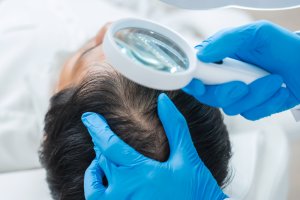 Hair loss and scalp issues are common concerns that affect millions of individuals worldwide, regardless of age or gender. While many people may dismiss these problems as a natural part of aging, they can significantly impact self-esteem and overall quality of life. Fortunately, dermatologists are equipped with the expertise and tools necessary to diagnose and treat various hair and scalp disorders effectively. This article explores how dermatologists can assist with hair loss and related conditions, providing insights into the causes, treatment options, and the importance of seeking professional help.
Hair loss and scalp issues are common concerns that affect millions of individuals worldwide, regardless of age or gender. While many people may dismiss these problems as a natural part of aging, they can significantly impact self-esteem and overall quality of life. Fortunately, dermatologists are equipped with the expertise and tools necessary to diagnose and treat various hair and scalp disorders effectively. This article explores how dermatologists can assist with hair loss and related conditions, providing insights into the causes, treatment options, and the importance of seeking professional help.
Understanding Hair Loss
Hair loss, medically known as alopecia, can manifest in various forms, including thinning hair, bald patches, and complete loss of hair. It is essential to recognize that losing a certain number of hair strands daily is normal; however, excessive shedding can indicate an underlying issue. Common types of hair loss include:
- Androgenetic Alopecia: Often referred to as male or female pattern baldness, this hereditary condition affects a significant portion of the population. It typically results in a gradual thinning of hair and receding hairlines in men, while women may experience overall thinning.
- Alopecia Areata: This autoimmune disorder leads to sudden hair loss in patches. The immune system mistakenly attacks hair follicles, causing hair to fall out.
- Telogen Effluvium: This temporary condition occurs when a significant number of hair follicles enter the resting phase, leading to noticeable shedding. It can be triggered by stress, hormonal changes, or medical conditions.
- Scarring Alopecia: This type of hair loss results from inflammation that damages hair follicles, leading to permanent hair loss. Conditions such as lichen planopilaris and frontal fibrosing alopecia fall under this category.
Understanding the type of hair loss is crucial for determining the appropriate treatment plan.
The Role of Dermatologists
Dermatologists are specialists in skin, hair, and nail disorders. Their training equips them to diagnose and treat a wide range of hair-related issues. When you visit a dermatologist for hair loss, they will typically follow a systematic approach to identify the underlying cause and recommend suitable treatments.
Initial Consultation
During your first appointment, the dermatologist will conduct a thorough evaluation, which may include:
-
- Medical History Review: Understanding your medical background, family history of hair loss, and any medications you are currently taking can provide valuable insights into potential causes.
- Physical Examination: A detailed examination of your scalp and hair will help the dermatologist assess the extent of hair loss and identify any visible signs of scalp conditions.
- Diagnostic Tests: In some cases, the dermatologist may recommend blood tests to check for hormonal imbalances, nutritional deficiencies, or underlying medical conditions that could contribute to hair loss.
Treatment Options
Once the dermatologist has identified the cause of your hair loss, they will develop a personalized treatment plan tailored to your specific needs. Treatment options may include:
Medications
-
- Minoxidil: This topical solution is commonly used to stimulate hair growth. It is available over-the-counter and can be effective for both men and women.
- Finasteride: An oral medication primarily used for male pattern baldness, finasteride works by blocking the hormone responsible for hair loss.
- Corticosteroids: For conditions like alopecia areata, corticosteroid injections can help reduce inflammation and promote hair regrowth.
Advanced Therapies
-
- Platelet-Rich Plasma (PRP) Therapy: This innovative treatment involves drawing a small amount of your blood, processing it to concentrate the platelets, and injecting it into the scalp. PRP contains growth factors that can stimulate hair follicles and promote regrowth.
- Laser Therapy: Low-level laser therapy (LLLT) is a non-invasive treatment that uses light to stimulate hair growth. It is painless and can be performed in-office or with at-home devices.
- Microneedling: This technique involves creating tiny micro-injuries in the scalp to stimulate collagen production and enhance the absorption of topical treatments.
Surgical Options
For individuals with advanced hair loss or those who do not respond to other treatments, hair transplantation may be considered. This surgical procedure involves relocating hair follicles from a donor site to areas of thinning or balding.
Lifestyle and Home Care
In addition to medical treatments, dermatologists often recommend lifestyle changes and home care practices to support hair health. These may include:
- Balanced Diet: Consuming a diet rich in vitamins and minerals, particularly those known to promote hair health, such as biotin, zinc, and iron.
- Stress Management: Engaging in stress-reducing activities like yoga, meditation, or regular exercise can help mitigate hair loss triggered by stress.
- Gentle Hair Care: Avoiding harsh hair products, minimizing heat styling, and using a soft brush can help prevent further damage to hair.
The Importance of Early Intervention
Seeking help from a dermatologist at the first signs of hair loss is crucial. Early intervention can lead to more effective treatment outcomes and may prevent further hair loss. Many individuals wait until their hair loss becomes severe before seeking help, which can limit treatment options and effectiveness.
Common Myths About Hair Loss
There are several misconceptions surrounding hair loss that can lead to confusion and misinformation. Some common myths include:
- Myth 1: Hair loss only affects men.
Fact: Women also experience hair loss, and it can be just as distressing. - Myth 2: Wearing hats causes hair loss.
Fact: Hats do not cause hair loss; however, tight hairstyles can contribute to traction alopecia. - Myth 3: Hair loss is solely genetic.
Fact: While genetics play a significant role, other factors such as stress, hormonal changes, and medical conditions can also contribute.
Hair disorders can be complex and multifaceted, but dermatologists are well-equipped to help individuals navigate these challenges. From diagnosing the underlying causes of hair loss to providing effective treatment options, dermatologists play a vital role in restoring hair health and boosting confidence. If you are experiencing hair loss or scalp issues, don’t hesitate to consult a dermatologist for a comprehensive evaluation and personalized treatment plan. Remember, early intervention is key to achieving the best possible outcomes in hair restoration.
We help Patients with Hair Loss and Scalp Issues
General Dermatology encompasses the complete range of disease and conditions of skin, hair and nails. Our goal is to help each of our patients achieve healthy, beautiful skin through proper skin care, skin surveillance, and accurate diagnosis and treatment of skin disease.
> Learn More
Contact Us (859) 283-1033 for a Consultation
—
 About Dermatology Associates of Northern Kentucky
About Dermatology Associates of Northern Kentucky
Dermatology Associates of Northern Kentucky offers a range of services for all age groups, including general and pediatric dermatology, dermatologic surgery, Mohs Micrographic surgery, laser and cosmetic procedures, and Dermatopathology.
> Learn More

 About Dermatology Associates of Northern Kentucky
About Dermatology Associates of Northern Kentucky